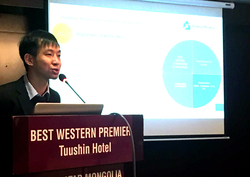Mongolia accelerates Building Energy Efficiency Deep Dive Program

A kick-off workshop on the Building Energy Efficiency Deep Dive Program was hosted on March 27 by the Ulaanbaatar City Environmental Department, together with ICLEI—Local Governments for Sustainability (ICLEI) and the World Resource Institute (WRI) under the assistance of the Global Green Growth Institute (GGGI).
The kick-off workshop aimed to develop a shared vision regarding the building efficiency policy and a pilot program for residential buildings. It is an opportunity for Ulaanbaatar city to publicly communicate its commitment. The main purposes of the kick-off workshop are to a) communicate the city’s commitment to pursuing building efficiency actions; b) identify and engage stakeholders who are critical to implement the selected policy and pilot program; and c) develop shared vision regarding the selected policy and pilot program.
Mr. E. Battulga, Head of the Ulaanbaatar Environmental Department Office delivered an opening speech. In his speech, he highlighted “Today`s seminar will be resulted to find exits how to successfully implement Deep Dive program. From the Ulaanbaatar side, we will be providing all required support for successful implementation of the program”.
The main discussion points of the workshop were as follows:
- Ulaanbaatar city`s role BEA phase I and II and future collaboration
- Building Efficiency and TTR for Residential buildings
- Current situation (Heating substation and network) of district heating system for apartment buildings in Ulaanbaatar
- Current situation of apartment buildings (Envelopes and insulation) in Ulaanbaatar city and heating system condition.
- Ulaanbaatar city role and much-needed gap, current activities within national and local budget, etc.
The BEA, the ICLEI East Asia Secretariat (ICLEI East Asia), and the Global Green Growth Institute (GGGI) have been supporting the Mayor’s office to achieve its residential energy efficiency targets, as well as to contribute toward the national goals. In cooperation with the Mayor’s Office, ICLEI East Asia and GGGI have developed an initial business model design that uses a Standard Offer Approach, which will introduce market-based energy performance contracting and innovative financing mechanisms for thermo-technical retrofitting (TTR) of the residential buildings.
In September 2016, Mongolia ratified its Intended Nationally Determined Contributions (INDCs) to the Paris Agreement on Climate Change in accordance with key national mandates and sectoral policies such as the Green Development Policy (2014) and its Action Plan (2016). Mongolia’s overall commitment is to reduce 14% of greenhouse gas emissions (GHG) by 2030 compared to Business-As-Usual (BAU). One of the main drivers to achieve this goal is to improve energy efficiency in production, distribution, transmission, and usage.
The Government of Mongolia set out ambitious targets and goals to improve energy efficiency, conservation of energy, and reduce energy losses. Among these, Mongolia’s Green Development Policy and INDC document set out a goal to reduce building heat loss by 20% by 2020, and 40% by 2030. Although there have been a number of legal and regulatory improvements to achieve energy efficiency potential in Mongolia, there is a gap in terms of residential buildings. In aggregate terms, this sector represents 40 percent of energy consumption, more than the industry and transport sectors combined. The residential building sector thus has greater potential to reduce energy demand and ultimately reduce CO2 emissions.
Ulaanbaatar city has the highest number of building stock in Mongolia. According to Mayor’s Office, there are 1077 pre-fabricated buildings in UB city that have high building heat loss. Mayor’s office has developed a sub-program to carry out thermal-technical retrofits for these buildings, starting with 362 buildings that have passed the earthquake resilience test.
Ulaanbaatar city, ICLEI East Asia, and GGGI are actively seeking to attract financing and carrying out necessary preparations to implement the TTR projects in the city.




